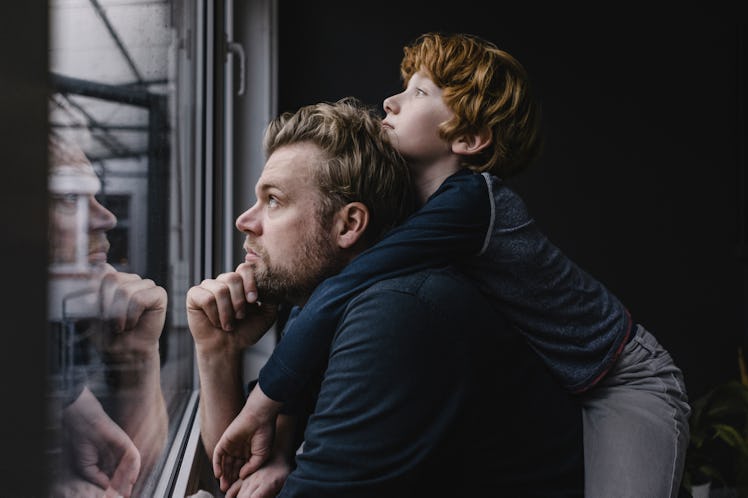How To Talk To Kids About Hurricanes And Scary Weather
First, turn off the TV, acknowledge their fear, and get them involved in a safety plan.

Blame it on the media. The outsized fear that kids have when it comes to inclement weather — be it a Category 5 hurricane or an everyday thunderstorm — comes straight from the news, which brings the world’s most devastating natural disasters straight to your living room. “Most other threats are not so visual,” explains Joanne Cantor, Ph.D., author of the children’s book Teddy’s TV Troubles. “And what they see strikes so close to home because it is homes. It takes no effort to understand the peril of that.”
The preschool and early elementary school children who are most susceptible to weather fears simply don’t have the ability to grasp the times and distances involved in severe weather coverage. A West Coast kid doesn’t get that a hurricane barreling towards South Carolina is far away. An East Coast kid doesn’t get that massive fires are on the opposite side of the country. And they don’t understand that the terrible footage of these natural disasters being looped during an interview aren’t happening over and over again in real life.
So it’s probably best, even when the desire to witness is overwhelming, to keep the footage turned off until kids are asleep. Or at least keep it relegated to discreet phone checks when kids are around. “In times of these horrible weather catastrophes, don’t leave the TV on,” Cantor says. “They don’t have to watch this on TV. Period.”
For some kids, however, it’s already too late. Their fear of bad weather may already be occupying their minds. For these more weather-sensitive kids, a little proactive preparation is key. That might include letting them know there are safety contingencies that will help keep them safe, like emergency kits and plans on where to seek shelter in the home.
“You can walk through those steps with them and make them routine,” Cantor says. She does recommend restraint though, going through the checklists and safety measure only when a child is frightened. “Just emphasize and re-emphasize all the ways there are to keep them safe. Get them involved.”
More than that, parents need to be careful of their language. To dismiss fears as unfounded erodes parental trust, because the kid has seen the damage happen (and knows you have too). Instead, parents can offer firm reassurance, leaving out phrases, like “it probably won’t ever happen here,” which Cantor calls honest but unhelpful.
Parents can also reassure kids that they will keep them safe no matter what. Sure, that might not be true. Things happen and sometimes kids are on the wrong side of probability. But even if a child were harmed in a tornado, Cantor argues, how much worse would it be if they’d been racked with anxiety? “It doesn’t hurt the child to feel safe,” she says.
Another language trick is to stay away from frightening words when describing weather events. Instead of “hurricane,” go with “big winds.” Instead of “flood,” go with “high water.” Abstract words allow them to fill in the gaps of knowledge with frightening thoughts.
Above all, Cantor reminds parents to have empathy with kids when it comes to weather. “They don’t understand it like you do.”
Sign up for the Fatherly newsletter to get expert advice about fitness, gear, travel, style, parenting, and more in your inbox.
This article was originally published on